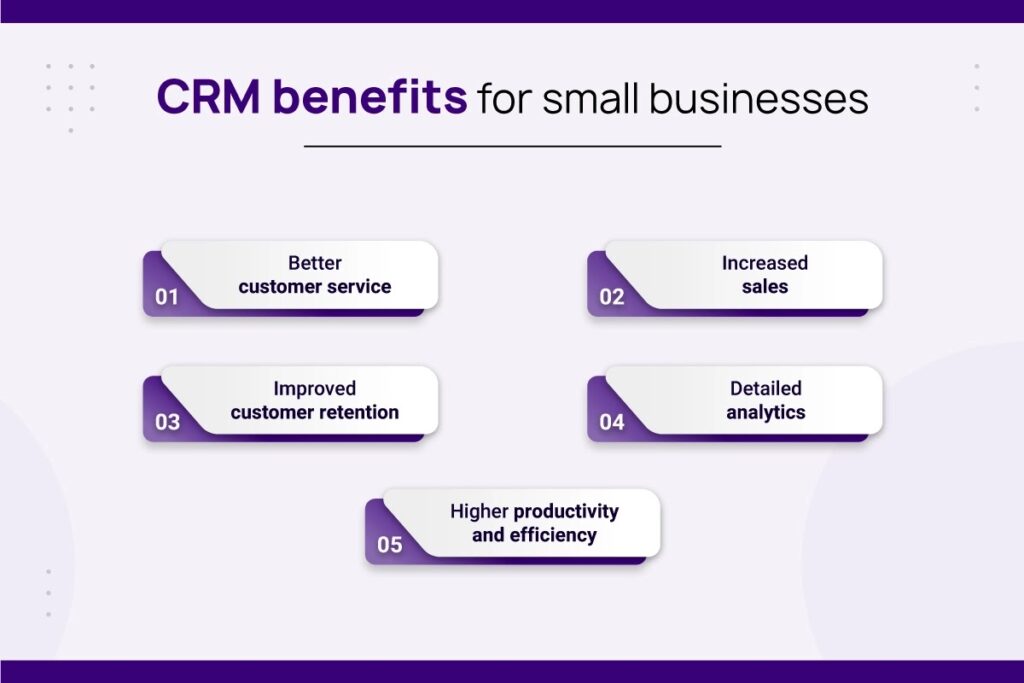From small businesses to large corporations, all are looking for an answer to know what drives their customers to purchase their products or prevents them from doing so. To do this, they need a dynamic system that can organize and analyze data about the customer’s preferences. This is where CRM systems come into play and in this competitive market, they have become indispensable tools for businesses.
Did you know? – 72% of businesses say that they use CRM softwares to gain access to customer data. That they can use to improve customer service, sales, and marketing. – resco.net
The truth is, that businesses have to go the extra mile to keep their customers happy in this digital age, where they have endless choices and can easily switch to a competitor with just a few clicks. CRM is the art and science of nurturing and managing customer relationships. A brand’s success depends on understanding and meeting customers’ needs throughout the customer journey, not just selling products or services.
Table of Contents
What is a CRM?
Customer Relationship Management (CRM) is a strategy driven by technology that empowers businesses to effectively handle customer interactions and relationships. The primary objective of implementing a CRM system is to enhance customer relationships and consequently increase the value of each customer over their lifetime.

Customer Relationship Management (CRM) software serves several purposes, including storing customer contact details, managing sales leads and streamlining tasks. It goes beyond being a software, rather it encompasses an approach that prioritizes placing the customer at the core of all business operations.
Types of CRM Software
Generally, CRM systems are categorized into four categories. With each having its own set of special features to meet the specific needs of businesses of all types. Mostly, businesses use a combination of these or a custom one built using some required features of the four main types.
No matter the type, all of them have the same goal, which is to manage relationships with customers. Here are the four major types of CRM softwares:
1. Operational CRM systems
These systems are designed specially to automate tasks. An operational CRM system can handle repetitive and time-consuming tasks like sales, marketing, and customer service.
It typically includes features for managing customer interactions, tracking sales opportunities, and storing customer data. This frees up time for representatives, which they can use to build meaningful relationships with customers.
2. Analytical CRM systems
An analytical CRM system is one that focuses on analysis and examines customer data. Offers insights into customer behavior.
It utilizes functionalities such as data mining, reporting, and forecasting to assist businesses in recognizing, comprehending, and leveraging customer trends and behavior. By utilizing this information businesses can generate leads, predict sales figures, and allocate budgets effectively. Generate reports.
3. Collaborative CRM systems
A collaborative CRM system is used to facilitate communication and collaboration between different teams and departments within a business as well as between employees and customers. It typically includes features like social media integrations, knowledge sharing, and documentation that gives access to up-to-date customer and employee data to team members in real time.
4. Strategic CRM systems
Strategic CRM refers to a customer approach to managing relationships. It involves gathering, organizing and utilizing customer information and market insights to enhance the value offered to customers.
Strategic CRM enables businesses to store customer data, monitor interactions and streamline tasks. By implementing CRM systems companies can enhance customer satisfaction, boost sales and achieve cost savings.
CRM benefits for small businesses

At its core, a CRM system is designed to manage and analyze customer relations throughout its lifecycle. It centralizes the collected customer data, making it accessible to all departments and employees within a small business. Here are some benefits of a CRM for small businesses:
1. Better customer service
In the realm of small businesses, personalization is paramount. Small businesses can enhance customer service by using CRM softwares.
It empowers businesses to understand their customers at a deeper level. By storing customer data, such as preferences, purchases and communication history, small businesses can tailor their interactions and offerings for individual customers. This personal touch can impress customers and result in better customer service delivery.
2. Increased sales
Another prominent advantage of CRM for small businesses is its impact on sales. CRM systems can help small companies identify potential leads and convert them into paying and regular clients.
Moreover, CRM systems can empower sales teams with valuable insights into customer behavior and preferences, with this they can tailor their sales pitches and strategies effectively.
3. Improved customer retention
Small businesses often rely on loyal customers for sustained success. After all, retaining existing customers is more cost-effective than acquiring new ones. CRM systems play a pivotal role in customer retention by empowering them to stay engaged with regular customers.
Automated follow-ups, personalized offers, and timely reminders are just a few CRM features that enable small businesses to nurture relationships, ensure customer loyalty, and repeat business.
4. Detailed analytics
Data is the new gold of the business world and CRM systems are a treasure trove of valuable information. Understanding customer behavior and preferences is crucial for a business of any size.
CRM systems provide detailed reports and analytics that small businesses can use to refine their tactics. From sales trends and customer behavior, CRM provides detailed insights in all categories that allow small businesses to make data-driven decisions.
5. Higher productivity and efficiency
Time is money, but the correlation between both is inversive. The less time a business uses to complete a task the greater its efficiency and productivity.
A Cloud Telephony-CRM Integration system can automate various administrative tasks, such as data entry and appointment scheduling which streamlines operations, especially in a small business. This frees up valuable time for small business owners and employees to focus on core business activities.
What features should I look for in a CRM?
When looking for a CRM system for your business, it is essential for you to consider some specific factors that align with your business needs. Here are crucial features to consider:
- Customer contact and communication tracking: A good CRM should enable you to maintain a comprehensive record of all customer interactions. This includes emails, phone calls, meetings, and more.
- Task and appointment scheduling: Efficient task management ensures that important follow-ups and important appointments are never missed. You should look for CRM software that has robust features to manage scheduling.
- Options for automation: Automation can save valuable time and remove human errors. Make sure that your CRM tool has automation features for routine and monotonous tasks and processes.
- Analytics that suit your metrics: Different businesses require different needs for metrics and analytics for success. Make sure that the CRM solution that you choose provides analytics and reporting capabilities that align with your business goals.
- Built-in collaboration tools: Collaboration within your team and colleagues is essential for seamless customer management. You should look for CRM software that facilitates internal communication and collaboration.
Closing Thoughts
CRM software is an asset that can assist businesses of all sizes in reaching their objectives. With its ability to improve customer service, boost sales, enhance customer retention, provide analytics and increase productivity, a selected CRM system becomes a crucial strategic tool.
Prioritizing and investing in CRM management is not just a choice, it’s a necessity for businesses aiming for sustainable growth and success. It’s the foundation upon which lasting customer relationships are built, and in today’s customer-centric world, that’s a foundation worth strengthening.
FAQs
What type of platform is CRM?
It is a platform that helps businesses to manage their interactions with customers and other prospects. A Customer Relationship Management(CRM) platform can be hosted on the cloud or be installed on the business’s own server. A cloud-based CRM platform is hosted by a third-party provider and its services are accessed over the internet. On the other hand, an on-premise CRM platform is installed and hosted on the business’s own server.
What is the role of Customer Relationship Management?
The purpose of Customer Relationship Management (CRM) is to establish enduring and financially rewarding connections with customers. This objective can be accomplished by comprehending customer requirements, delivering customer assistance and tailoring the customer experience to their preferences.
Why is CRM important?
CRM is an important tool because it can help businesses increase sales, improve customer service, automate tasks, and improve collaboration across all departments.
What is an example of a CRM tool?
Some examples of CRM tools are HubSpot, Salesforce, Zoho CRM, Pipedrive, and SugarCRM. These tools can be implemented into your business communication system to boost productivity and efficiency.
What is the difference between CRM and ERP?
CRM is a software tool that is used specifically to build and nurture customer relationships and interactions. On the other hand, Enterprise Resource Planning (ERP) is a type of business software that focuses on integrating and managing various business processes and acts as a bridge for all departments to access the central database.
Author Bio:
Sienna Martin is a senior editor at KrispCall, a company that provides virtual business phone and cloud-based VoIP telephony services. As a senior editor, Sienna is responsible for overseeing the editorial process and ensuring that the content produced by KrispCall is of high quality and meets the needs of their audience.


